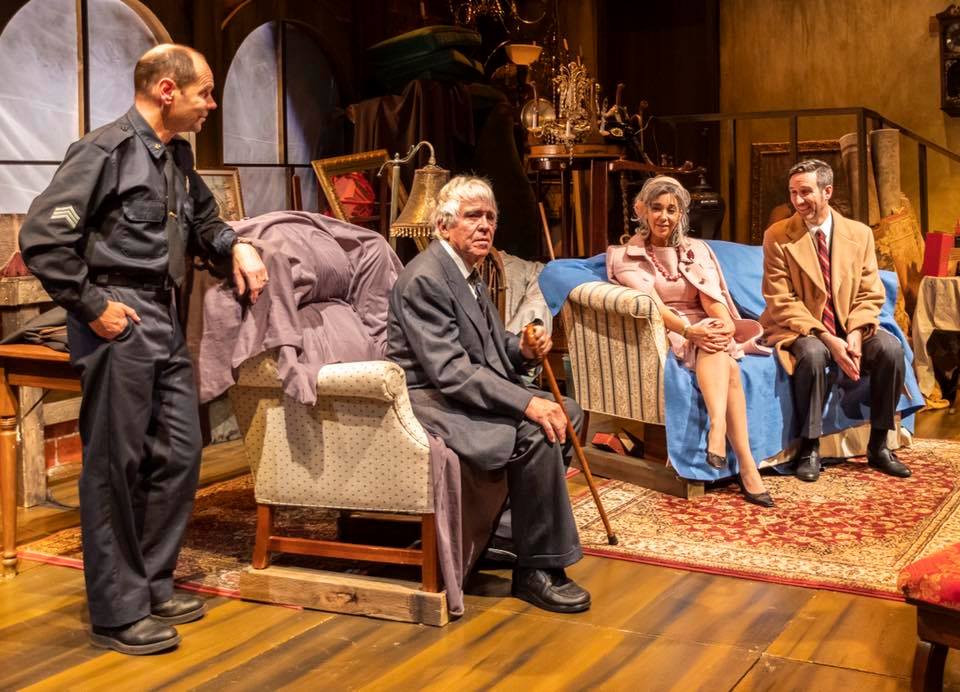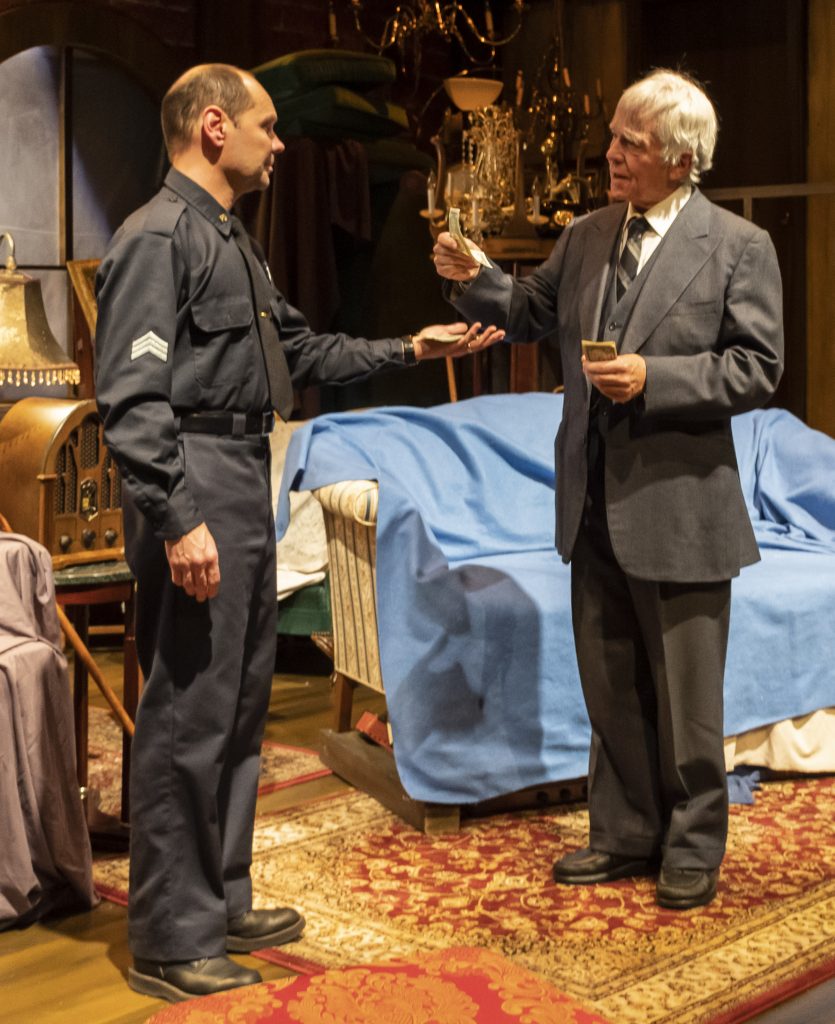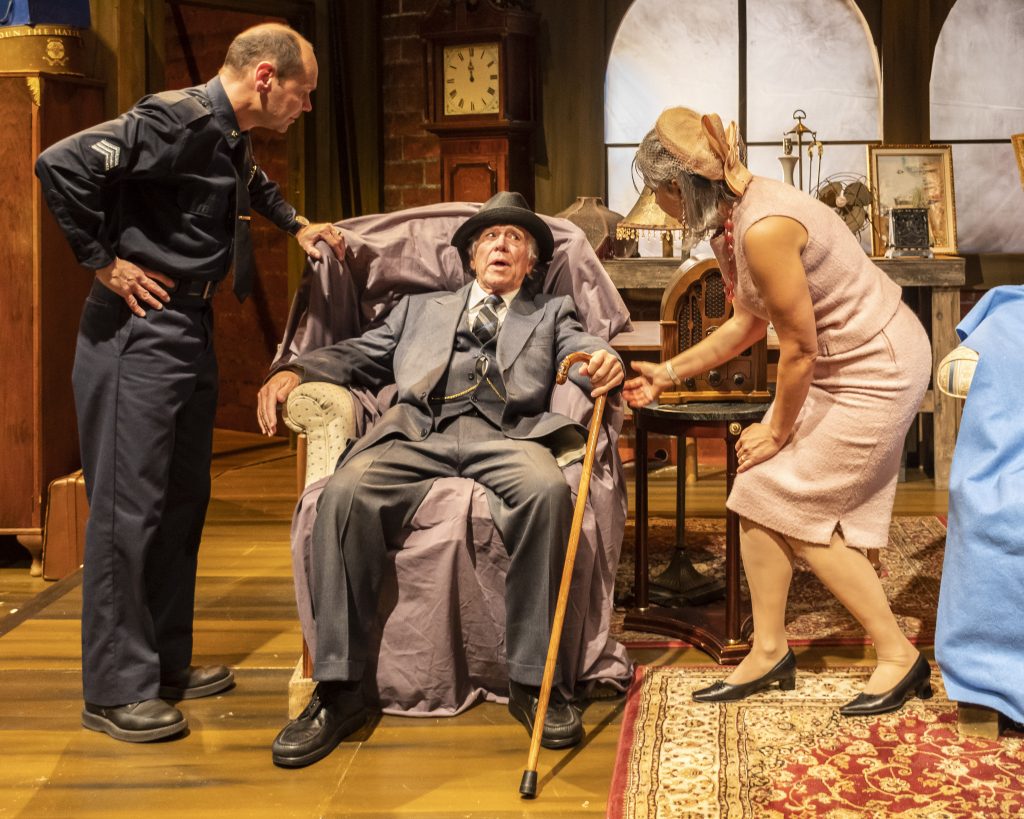
Credit: Nancy Caldwell. Set design: R. Todd Parker
At Jericho Arts Centre until December 1, 2019
Tickets from $23 at unitedplayers.com or 604-224-8007
Posted November 10, 2019
The Price, written by Arthur Miller in 1968, is enjoying something of a recent revival: March 2017 (New York), August 2018 (Bath), February 2019 (London) and now a United Players production at the Jericho Arts Centre.
Tellingly, the play was nominated for, but failed to win, the 1968 Tony Award for Best Play; subsequent nominations – and there have been many – are mostly for outstanding or best performance by an actor in a lead role. It’s a play for four very good actors who must be capable of overcoming Miller’s melodramatic heavy-handedness.
The script leaves itself open to criticism and has received lots of it. Clive Barnes, reviewing the premiere performance in February 1968 for the New York Times, hit the nail on the head when he wrote, “Miller’s confrontation is too rigged, too pat. We are asked to believe too much.” By today’s standards, the play can be ploddingly and repetitively ‘talky’. And Barnes is right about the language of the play: “Miller has them breathing the dust of the theater rather than the air of the streets.”

Credit: Nancy Caldwell
“Dust” of the theatre is apt. The Price takes place in 1968 in a Manhattan brownstone attic stuffed with the long-stored furnishings of a family home. (R. Todd Park, set designer, and Josina de Bree, props design, deserve an award for the gorgeous jumble of tables, chandeliers, lamps, sofas, chairs, Victrola, rugs, clocks, etcetera.) The parents of Victor (a New York cop) and Walter (a rich, successful surgeon) have been dead for almost two decades; the building is about to be demolished and the stuff has to be disposed of. Their father had once been rich but declared bankruptcy during the Great Depression and the furniture, including a valuable harp, has been stored in an attic for years.
The brothers have been estranged since the death of their parents and Victor, who looked after their father until the end, has hired an antique dealer to assess and buy up the stuff. Wanting to be fair about the disbursement, Victor has contacted brother Walter.
Just as we expect Walter to turn up, Miller introduce an extraordinary character named (too prophetically) Solomon.
Writes Clive Barnes regarding Solomon: “an incredibly aged, incredibly wise antiques dealer, who has come, almost out of retirement (“You must have looked up my name in a very old telephone book”), to give a price for the furniture. From then on Solomon weaves through the play, part comic relief, part dramatic contrast, always amusing, always apt.” Other-worldly might also describe him.
Here’s the catch: the actor playing Solomon must also be incredibly charismatic or it doesn’t work. Actor Sjahari Hollands gives it his best shot but it’s not enough. In a bold move, Miller removes Solomon from the action for a long period of time; when Solomon reappears, we wish he had stayed in the bedroom. He’s like some old fart that corners you in a bar. (Danny DeVito won the Drama Desk Award and the Outer Circle Critics’ Award when he played the role in the 2017 Broadway revival. That’s how good the actor’s chops just have to be.)
Patrick Bahrich (as Victor), Christine Iannetta (Victor’s wife Esther) and Rob Monk (Walter) do their best but with a play that relies so heavily on us truly believing in and caring about these characters, a lot of skill is required to overcome Miller’s on-the-nose dialogue.

Credit: Nancy Caldwell
And it’s a pity because Miller is really onto something in this play. And that something (or those somethings) are still pressingly relevant. In his program notes, director Adam Henderson quotes Oscar Wilde: “A cynic knows the price of everything but the value of nothing.” What has greater value: becoming a rich surgeon (but losing his soul) or giving up his dreams – as Victor has (but knowing he has been a good son)? Should Walter have been his brother’s keeper and given him money when he needed it to finish college? Walter, a largely unsympathetic character, is correct to some extent: we invent our lives. He invented his and Victor did the same. Victor must have known his father had some money in addition to the $5/month that Walter has been coughing up. And there’s that harp that could have been sold. So did Victor willingly and knowingly not pursue his education? If so, why not?
One minute we think Victor is right; the next, we wonder if Walter doesn’t make a good point.
Sibling rivalry. Lost opportunity. Conflicting values. It’s all there. It’s all still here.
Of the 2019 London revival, The Guardian’s Michael Billington had this to say: “On its Broadway review in 1968, Arthur Miller’s play was dubbed by one critic ‘a museum piece’. If it is, it has stood the test of time and now emerges, in Jonathan Church’s superbly acted production with David Suchet in the show-stealing role of an old furniture-dealer, as one of Miller’s best plays”.
That’s a production I wish I’d seen.

